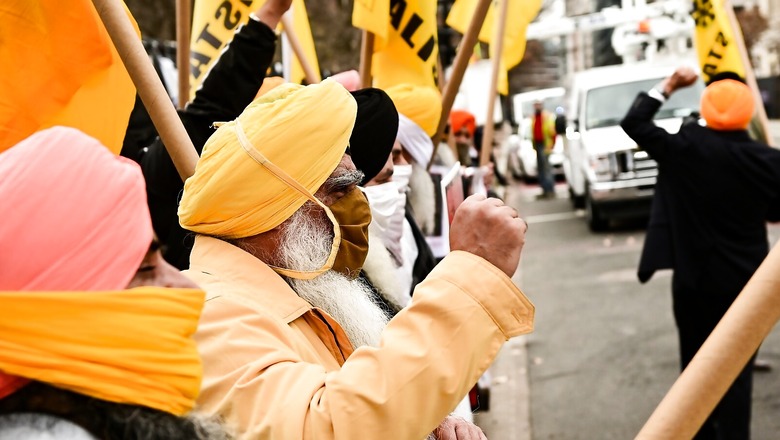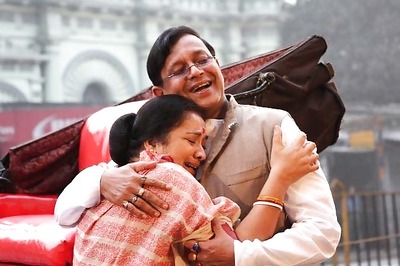
views
The denial of India’s request to issue a red corner notice against founder of pro-Khalistan group Sikhs for Justice, Gurpatwant Singh Pannun, was in accordance with the Interpol’s constitution to not intervene in matters of religious significance, the Secretary General of the world police organisation told News18.
The Central Bureau of Investigation, which is India’s liaison with the Interpol, had sent the request of the National Investigation Agency seeking red corner notice against Pannun, but it was returned with further queries.
Speaking exclusively to News18, Interpol Secretary General Jurgen Stock said he would not wish to comment on individual cases, but added: “It is strictly forbidden for the organisation to enter into any activity that might have predominantly political, military, religious or racial content or meaning. We have to strictly stay away from that and that sometimes leads to the fact that we decline requests from member countries for cooperation.”
Article 3 of the Interpol Constitution states: “It is strictly forbidden for the Organization to undertake any intervention or activities of a political, military, religious or racial character.”
Fringe organisation SFJ, run by a few radical Sikhs of foreign nationality in the US, Canada, the UK, etc, was declared unlawful under the provisions of Section 3(1) of the Unlawful Activities (Prevention) Act, 1967. The Centre by its July 10, 2019 notification had declared SFJ unlawful association and had banned it for five years, saying the group’s primary objective was to establish an “independent and sovereign country” in Punjab and it openly espouses the cause of Khalistan and in that process, challenges the sovereignty and territorial integrity of India.
This was later upheld by a Unlawful Activities (Prevention) Act tribunal headed by Delhi High Court Chief Justice D N Patel. Multiple agencies have filed cases against Pannun who has been declared as an “individual terrorist” under the fourth schedule of UAPA (Unlawful Activities Prevention Amendment Act).
Sources told News18 that evidence against Pannun included his alleged funding of Khalistani terrorists and secessionist activities. Interpol declined to issue the red corner notice based on this evidence. Sources said the evidence may have been seen by Interpol as reference to Pannun’s Sikh identity rather than criminal activities.
Secretary General Stock, however, said this should not be seen as a comment on the evidence per se. “I understand that (refusal to issue red corner notice) sometimes frustrates member countries, but that is part of the success story that Interpol has…. that we all respect the limited mandate of Interpol…But any decision by Interpol not to engage in a case does not mean any judgement on the merit of the case. We have no business getting into that,” the head of the Interpol Secretariat said.
He said the option of appealing against the Interpol decision was available to India, but added that Pannun, too, can plead his case before the organisation. “Member countries can use other channels if they want police cooperation. This is the reason that in spite of the geopolitical difficulties in the past decade, Interpol was out growing, because that principle was respected,” he said.
Indian government sources told News18 that India could appeal against Interpol’s decision by highlighting individual crimes that Pannun is accused of by the NIA, Punjab Police and even Himachal Pradesh Police once the chargesheet is filed.
The controversy over the refusal of red corner notice has come just ahead of the 90th General Assembly of the world police body which India is hosting this year. Prime Minister Narendra Modi will inaugurate the event on October 18 while Union Home Minister Amit Shah is expected to give the plenary address on October 21.
On the Russia-Ukraine war, Stock said one of the challenges Interpol is facing ahead of the General Assembly is how to deal with Moscow. Sources told News18 that member countries from the West have asked that Russia be expelled from Interpol. Officials said that the Interpol constitution has no provision to expel a member country.
But Jurgen Stock confirmed that this issue will be discussed during the upcoming General Assembly. “The topic will be discussed here in New Delhi, but we have to focus on our neutral and independent position as a technical police organization. We operate in a certain political environment, that is quite clear. But any gap that we leave in international police cooperation will be exploited by criminals,” he said.
Stock said that though the final decision on Russia will be deliberated in the General Assembly meetings, his personal view was not to leave any holes in international police cooperation for criminals and terrorists to exploit. “When member countries are in conflict with each other, there is need more than ever to stick to the basic principles of Interpol,” he said.
Read all the Latest News India and Breaking News here


















Comments
0 comment